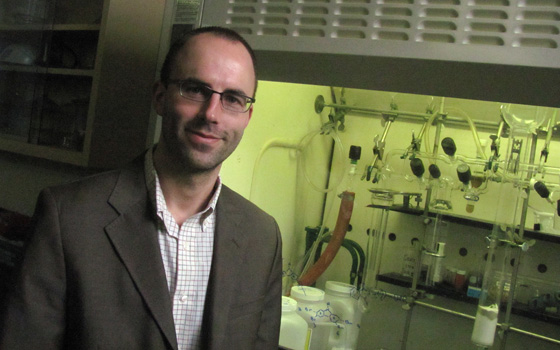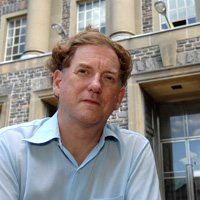TheyŌĆÖre at the forefront of leading-edge research fields, from sorting through the overwhelming mass of words in our lives to developing electronics that can bend their shape.
Today, two of DalŌĆÖs newest faculty members ŌĆö Stan Matwin of the Faculty of Computer Science and Greg Welch of the Department of Chemistry ŌĆö were awarded new Canada Research Chairs by the Government of Canada. A third ┬ķČ╣┤½├Į researcher, James Drummond of the Department of Physics and Atmospheric Science, had his Canada Research Chair renewed.
The announcement was made this morning at Western University by the Honourable Gary Goodyear, Minister of State (Science and Technology). It included $90.6 million in support to 120 new and renewed Canada Research Chairs across the country.
Sorting through a world of words
The digital age has put more words at our fingertips than at any point in human history. And Stan Matwin, who joined DalŌĆÖs Faculty of Computer Science this January, is developing tools to help manage it all.
As the Tier I Canada Research Chair in Visual Text Analytics, his team will develop machine learning methods that extract interesting and useful knowledge from huge blocks of text ŌĆö databases, document collections, social media ŌĆö organizing it so it can be applied to solve real problems.
ŌĆ£YouŌĆÖve heard the term ŌĆśbig dataŌĆÖ; well, this is part of that, but itŌĆÖs ŌĆśbig textŌĆÖ in particular,ŌĆØ he explains.
At the University of Ottawa, Dr. Matwin led text analytics projects in a wide variety of fields: helping medical researchers more efficiently find relevant abstracts in databases of hundreds of thousands of documents, analyzing the sentiment of tweets during presidential elections, even helping psychologists find patterns in dream recordings.
ŌĆ£WhatŌĆÖs interesting to me is fusing data related to the same subject,ŌĆØ he explains. ŌĆ£Medicine is a great example: you may have some data thatŌĆÖs mostly numbers, but then you have doctors' or nurses' notes in text, as well as images and external collections of knowledge from the field. The exciting thing is to put them together, get the data to talk with one another.ŌĆØ
Though he just arrived on campus, Dr. Matwin already has several major grant proposals well underway. HeŌĆÖs completing a study on Twitter sentiment during the 2012 French presidential election, and is also excited to connect his work with HalifaxŌĆÖs medical and IT communities. He says heŌĆÖs most eager for the opportunity to bring his expertise to Halifax and ┬ķČ╣┤½├ĮŌĆÖs booming ocean sciences sector.
ŌĆ£IŌĆÖm looking forward to connecting these types of problems [that I explore] with researchers doing work with oceans data. They have big data sets, and IŌĆÖm meeting with them as we speak at how we can do something together, so we can build a world-class centre for big marine data in Halifax.ŌĆØ
Printed electronics: just around the bend
┬ķČ╣┤½├ĮŌĆÖs second new Canada Research Chair announced today is Greg Welch of the Department of Chemistry. He becomes the Tier II Canada Research Chair in Organic Functional Materials, focused on developing organic chemical materials that can be used to create lightweight, flexible components for electronic devices: imagine solar panels that could be unrolled like paper, or phone or television screens that would bend and change shape.

Dr. Welch in the lab. (Ryan McNutt photo)
ŌĆ£As soon as you replace inorganic components with organic, you open this whole new world of solution processing which allows us to fabricate these devices onto lightweight, flexible substrates,ŌĆØ says Dr. Welch. ŌĆ£You can bend, stretch and manipulate them in all sorts of new ways.ŌĆØ
Dr. Welch, who came to Dal last year after completing his postdoctoral work at the University of California at Santa Barbara, is creating an advanced organic materials laboratory in the Department of Chemistry. There, his team will make next-generation organics that can effectively and efficiently absorb and emit light, or transport a charge, or complete other processes depending on what sort of device theyŌĆÖre designed for.
His work, by nature, requires partnerships with physicists and materials scientists to test and refocus these materials. And on that front, a lot of that collaboration will be done right here at Dal: Dr. Welch has already struck a strong working relationship with Professor Ian Hill of the Department of Physics and Atmospheric Science, whose lab studies precisely the sort of organic thin film transistors and solar cells that these materials are designed for.
ŌĆ£┬ķČ╣┤½├Į is a very unique university because itŌĆÖs small, so the faculty can easily communicate,ŌĆØ he says. ŌĆ£ItŌĆÖs a very open, collaborative environment, so it allows for very rapid sharing of ideas, and everyone is here to work together. And thereŌĆÖs a genuine interest on the part of students in new technologies out here. I think Nova Scotia is a very progressive province: itŌĆÖs built on going a little different, and alternative energy is big out here.ŌĆØ
As well, Dr. Welch says being able to do this work in Canada is important. (He says heŌĆÖs ŌĆ£unashamedly patriotic,ŌĆØ in that way.) With the organic electronics market set to become a billion-dollar industry in the next decade, he says Canada lags behind other countries in the field, but heŌĆÖs eager to help the countryŌĆÖs industry catch up to and surpass its international competition.
ŌĆ£We want to contribute to Canadian society,ŌĆØ he says. ŌĆ£We want to generate IP here.ŌĆØ
Global leaders
 ┬ķČ╣┤½├Į also had a Chair renewal in todayŌĆÖs announcement: James Drummond of the Department of Physics and Atmospheric Science was renewed as the Tier I Canada Research Chair in Remote Sounding of Atmospheres. HeŌĆÖs an international leader in space instrument design, testing and deployment, and his work uses satellites and ground-based observations to study the composition of the atmosphere. With new, specialized instruments, Drummond and his colleagues are collecting information that informs how best we can keep the air around us healthy.
┬ķČ╣┤½├Į also had a Chair renewal in todayŌĆÖs announcement: James Drummond of the Department of Physics and Atmospheric Science was renewed as the Tier I Canada Research Chair in Remote Sounding of Atmospheres. HeŌĆÖs an international leader in space instrument design, testing and deployment, and his work uses satellites and ground-based observations to study the composition of the atmosphere. With new, specialized instruments, Drummond and his colleagues are collecting information that informs how best we can keep the air around us healthy.
The Canada Research Chairs program invests approximately $300 million each year toward research in engineering and the natural sciences, health sciences, humanities and social sciences.
┬ķČ╣┤½├Į has 53 Canada Research Chairs in total, more than any university in Atlantic Canada.

